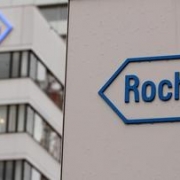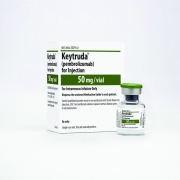Roche Holding AG decided to withdraw the company’s immunotherapy Tecentriq as a treatment for a type of breast cancer in the United States, the drugmaker said on Aug. 26 following a consultation with the Food and Drug Administration.
Bristol Myers Squibb’s Opdivo (nivolumab) 240 mg every two weeks or 480 mg every four weeks (injection for intravenous use) was approved by the U.S. Food and Drug Administration for the adjuvant treatment of patients with urothelial carcinoma who are at high risk of recurrence after undergoing radical resection, regardless of prior neoadjuvant chemotherapy, nodal involvement or PD-L1 status.
Junshi Biosciences announced that the Phase III clinical trial the Chinese pharmaceutical company is conducting alongside California-based Coherus BioSciences on a potential non-small cell lung cancer (NSCLC) drug is showing positive preliminary results.
The U.S. Food and Drug Administration approved the combination of Merck’s anti-PD-1 therapy Keytruda plus Eisai’s orally available multiple receptor tyrosine kinase inhibitor Lenvima for the first-line treatment of adult patients with advanced renal cell carcinoma (RCC).
Findings from the Phase III EMPOWER-Lung 3 trial, announced Aug. 5 by Regeneron Pharmaceuticals and Sanofi, show that a combination regimen comprising the PD-1 inhibitor Libtayo and platinum-doublet chemotherapy significantly improved overall survival compared with chemotherapy alone in patients with metastatic or locally advanced non-small cell lung cancer (NSCLC).
The Phase 3 KEYNOTE-716 trial investigating Merck’s anti-PD-1 therapy Keytruda met its primary endpoint of recurrence-free survival (RFS) for the adjuvant treatment of patients with surgically resected high-risk stage II melanoma.
The U.S. Food and Drug Administration issued Incyte Corporation with a Complete Response Letter (CRL) over the company’s Biologics License Application (BLA) for retifanlimab for anal cancer.
Opdivo/Yervoy Combo Fails to Meet Endpoints in Head and Neck Cancer
Blockbusters, Bristol Myers Squibb, Checkpoint Inhibitors, Clinical Trial Endpoints, Clinical Trials, Head & Neck Cancer, Head & Neck Squamous Cell Carcinoma (HNSCC), Overall Survival (OS), PD-1/PD-L1 inhibitors, R&D, Secondary EndpointsBristol Myers Squibb shared new details on the global biopharmaceutical firm’s Phase III research on a potential first-line treatment for people who have been diagnosed with recurrent or metastatic squamous cell carcinoma of the head and neck.
The U.S. Food and Drug Administration approved an expanded label for Merck’s anti-PD-1 therapy Keytruda as monotherapy for the treatment of patients with locally advanced cutaneous squamous cell carcinoma (cSCC) that is not curable by surgery or radiation.
Evolution of US Payer Management of Oncology, an examination of Non-small Cell Lung Cancer (NSCLC) and Chronic Lymphocytic Leukemia (CLL)
Analysis, Bruton's Tyrosine Kinase (BTK) Inhibitors, Chronic Lymphocytic Leukemia (CLL), Clinical Trials, Insurance Companies, Non-Small Cell Lung Cancer (NSCLC), Oncology, Payers, PD-1/PD-L1 inhibitors, R&D, Surveys, Therapeutics, United StatesTraditional management tools have proven to be ineffective at managing costs for oncology drugs, leading to a hands-off management approach in the United States. But a recent survey from Two Labs – including 25 Pharmacy Directors and Medical Directors at US insurance companies representing 112.5 million covered lives – shows that the situation might be changing. The survey aimed to gather insight about what the industry looks like with increased levels of care management by covering traditional management tools, oncology-specific tools, systemic management tools and shifting risk, value frameworks, and pathways of care.









